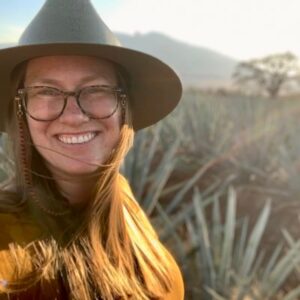Congratulations to Christina Snyder, McCabe Greer Professor of the American Civil War Era at Penn State and Richards Center affiliate faculty, who has been awarded a 2024 Guggenheim Fellowship from the John Simon Guggenheim Memorial Foundation. She will use the fellowship to work on her third book project, American Abolitions: The Slow Death and Many Afterlives of Slavery. Dr. Snyder calls this prestigious fellowship “one of the greatest honors of my career.” Read more in this excellent feature from Penn State News.

The Richards Center is thrilled to announce that the first Persun Visiting Scholar will be KT Shively! 2024–2025 will be the inaugural year of the Mark and Ann Persun Visiting Scholars Program for tenured faculty in history at the rank of Associate Professor. More information about the program, which supports scholars of Civil War Era military or political history to develop a book-length work-in-progress, can be found here.
Kathryn “KT” Shively is an associate professor of Civil War and Reconstruction history at Virginia Commonwealth University with specialties in early American military, environmental, and medical history. They are the author of Nature’s Civil War: Common Soldiers and the Environment in 1862 Virginia (University of North Carolina Press, 2013) and co-editor with Caroline Janney of the forthcoming volume, The Second Manassas Campaign (UNC Press, expected 2025). They also serve as co-PI with Paul Quigley (Virginia Tech) on the NEH-funded public history project, “Experiencing Civil War History Through Augmented Reality: Soldiers, Civilians, and the Environment at Pamplin Historical Park.” Their second monograph, History Wars: Jubal A. Early and the Confederate Origins of Modern American History, is under contract with University of Georgia Press for submission in 2025. Their favorite part of being a Civil War historian is giving battlefield tours, and they spend their non-working hours hosting bluegrass jams, making pies, hiking, and reading with their kid.
![KT Shively Medio Photo 2024[79]](https://richardscenter.la.psu.edu/wp-content/uploads/sites/18/2024/04/KT-Shively-Medio-Photo-202479-300x272.png)
The Richards Center is excited to share that Allison Mitchell and Hannah Hicks will join us as postdoctoral scholars for the 2024–25 academic year. Allison will be the Richards Center/Africana Research Center Postdoctoral Scholar in African American History and Hannah will be the Richards Center Postdoctoral Scholar in the Civil War Era. We can’t wait to have these two fantastic scholars with us at Penn State!
Allison Mashell Mitchell will receive her Ph.D. in History from the University of Virginia, and specializes in twentieth-century African American history, focusing on Black electoral politics, political realignment, southern history, and civil rights studies. Her dissertation, “Battle for the Ballot: A History of Black Electoral Politics and Voter Suppression in Florida, 1940-2000s” uses Florida as a case study to analyze the role of Black Americans in political realignment in the South from the U.S. Supreme Court’s 1944 Smith v. Allwright ruling to the aftermath of the 2000 presidential election. Along the way, it traces Black Floridians’ tumultuous relationship with the Democratic Party and capricious interactions with the GOP since World War Two. She challenges the traditional periodization and white American-centered narratives of political realignment scholarship by emphasizing points of contention in state-level and southern politics that display the inherent failure of the U.S. two-party system. Allison received her BA in History and African American Studies at the University of Florida. Her work has been supported by the Jefferson Scholars Foundation, the Samuel Proctor Oral History Program at the University of Florida, and the James Weldon Johnson Institute for the Study of Race and Difference at Emory University.
Hannah Katherine Hicks received her PhD in History from Vanderbilt University and specializes in nineteenth-century U.S. history, focusing on women and law and the intersections of gender, medicine, and law. Her dissertation, “Troubling Justice: Women and the Criminal Courts in the Post-Civil War South” draws on county-level court records to examine criminal courts in postbellum South Carolina and the primarily working-class Black and White women who frequently appeared in them as defendants, complainants, and witnesses. At the Richards Center, Hannah will work on turning this dissertation into a book manuscript. Hannah was most recently an Assistant Teaching Professor of History at UNC Charlotte, which is also her undergraduate alma mater. In Winter 2022, the Bulletin of the History of Medicine published her article entitled “A Conjure Woman in Court: African American Conjurers as Health Practitioners and Performative Poisoners in the Post-Emancipation South.” Hannah’s research has been supported by the American Historical Association, the South Caroliniana Library, the Wilson Library at UNC Chapel Hill, and the Robert Penn Warren Center for the Humanities at Vanderbilt University.
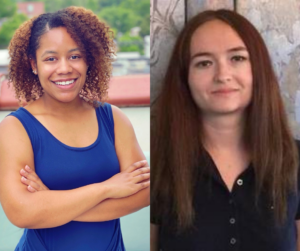
On April 18, 19, and 20, 2024, Dr. Thavolia Glymph, Peabody Family Distinguished Professor of History and Professor of Law at Duke University, will deliver three lectures on “Playing ‘Dixie’ in Egypt: A Transnational Transcript of Race, Nation, Empire and Citizenship” for the Steven and Janice Brose Distinguished Lecture Series. The lectures are free and open to the public, and the schedule is as follows:
“’I am not going into the wilds of Africa’: Race and Nation in the Imagination of U.S. Civil War Veterans in Egypt” | Thursday, April 18, 5 p.m. | Foster Auditorium (102 Paterno Library)
“Playing ‘Dixie’ in the Wilds of Africa” | Friday, April 19, 5 p.m. | Foster Auditorium (102 Paterno Library)
“Egypt in the American Imaginary and the Making of an American Archive of Race and Nation” | Saturday, April 20, 11:30 a.m. | Foster Auditorium (102 Paterno Library)
“Playing ‘Dixie’ in Egypt: A Transnational Transcript of Race, Nation, Empire and Citizenship” is a study of white Union and Confederate soldiers who joined the Egyptian army of the Khedive Isma’il after the Civil War. It explores why they left the U.S. to become mercenaries of a foreign army and, more centrally, the part they played in making and transcribing notions of race, citizenship, nation, and empire globally and at home. For more information on this lecture series, click here.
The Brose Lecture Series is sponsored by the George and Ann Richards Civil War Era Center at Penn State through the generosity of an endowment by Steven and Janice Brose and co-sponsored by the Penn State University Libraries.

We are searching for two predoctoral scholars in the history of the Civil War era! The start date is July 1, 2024. This is a one-year fellowship. Fellows have no teaching or administrative responsibilities; they will primarily focus on their dissertation and participate in the Richards Center scholarly community.
We conceive of the Civil War era broadly. We especially welcome projects related to the history of slavery, emancipation, and their legacies and the history of struggles for freedom and democracy in the United States.
The fellowship includes a $40,000 stipend and $3,000 in research funds. For more information on the Richards Center Predoctoral Fellowships, including how to apply, visit https://richardscenter.la.psu.edu/fellowships/postdoctoral-fellows/.
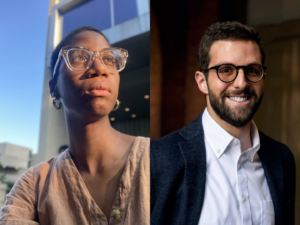
Call for applications for the Catto-LeCount Fellows Program! Application deadline has been extended to Friday, February 2, 2024. During this three-day, in-person program on Penn State’s University Park campus, Penn State faculty and graduate students demystify the graduate school admissions process and educate participants about the academic profession
You can find more information on our Fellowships page: https://richardscenter.la.psu.edu/fellowships/catto-lecount-fellows-program/
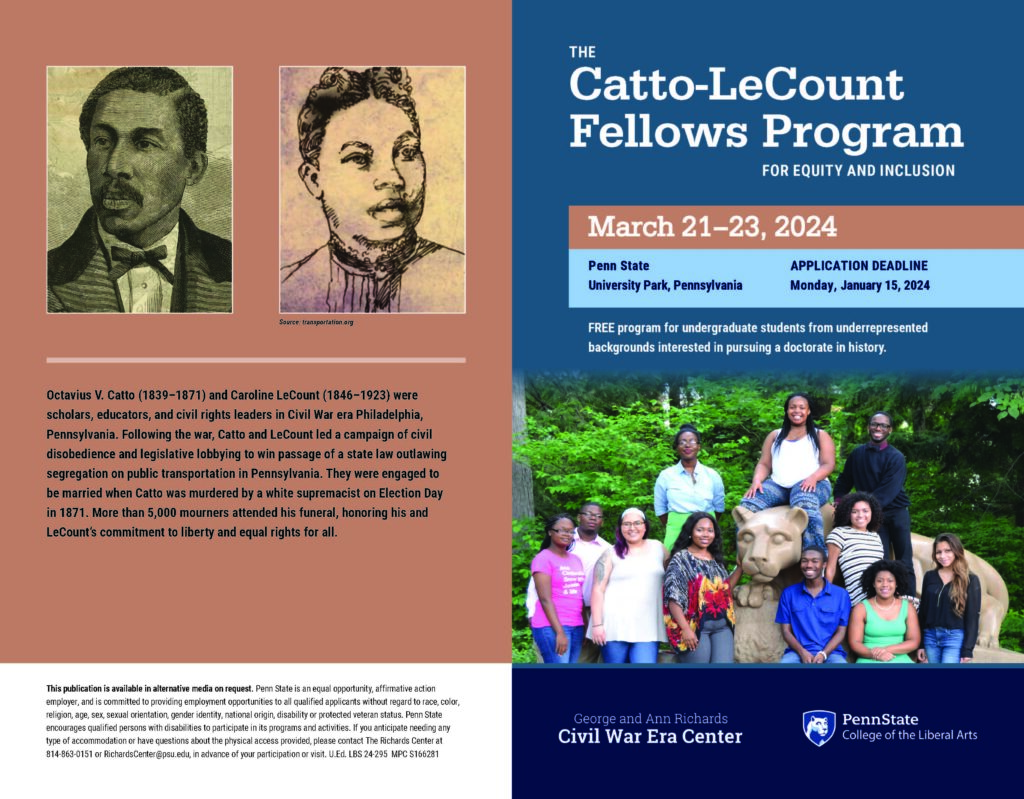
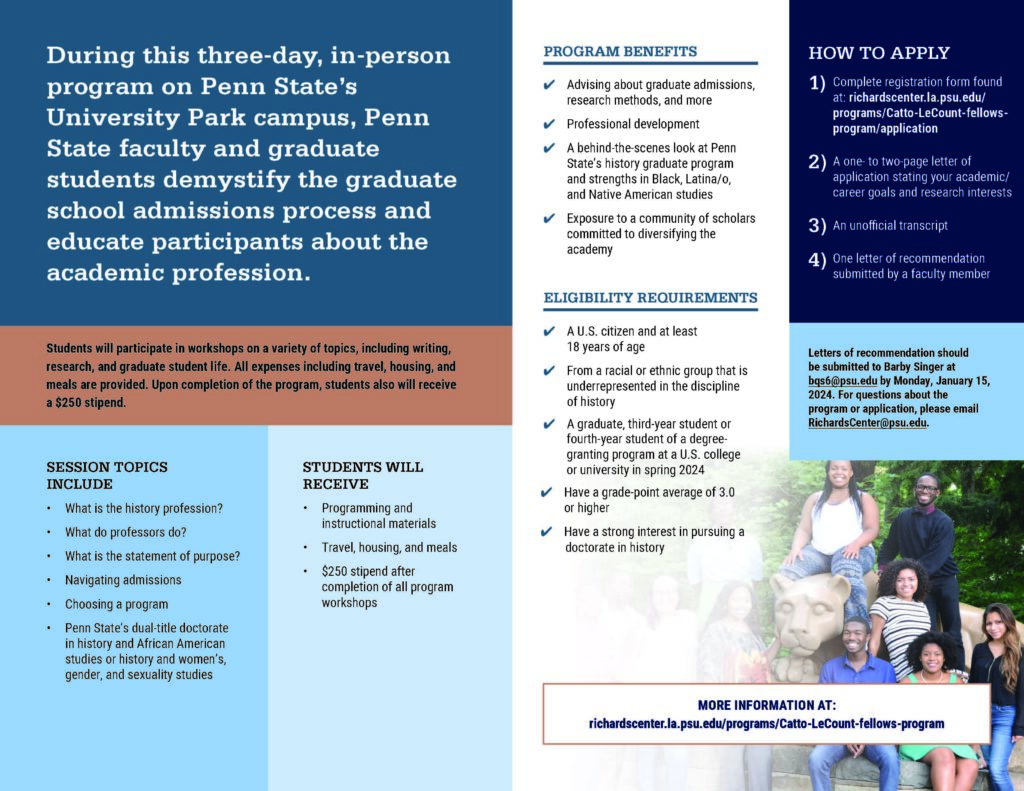
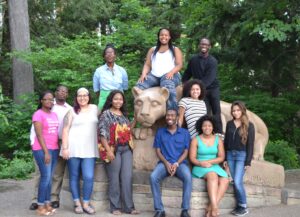
Do you have an interest in preserving U.S. history and sharing it with the public? Do you
want to put your knowledge of history and your research skills to good use this summer?
The Richards Civil War Era Center at Penn State invites applications from qualified Penn
State undergraduate students for two paid positions at Harpers Ferry National Historical
Park, and three paid positions at the National Park Service’s Gettysburg National Military
Park during the summer of 2024. The internships provide students with hands-on public
history and archeology work experience. These noncredit internships come with a $3,500
stipend and free housing at the national parks.
Gettysburg National Military Park and Harpers Ferry National Historical Park
Deadline: Monday, January 15, 2024
Harpers Ferry National Historical Park is looking for:
Interpretation intern: Are you interested in presenting engaging history content to the
public? This in-person internship is an opportunity to work in Public History with National
Park Service rangers in the Harpers Ferry’s Interpretation, Education, and
Partnerships team. This intern will develop public presentations and walking tours on a
variety of topics, including but not limited to, the United States Armory and industry at
Harpers Ferry, American slavery, John Brown’s raid, the Civil War, Storer College (one of
the nation’s first HBCUs), and the genesis of the Civil Rights movement including the
Niagara Movement and the National League of Colored Women. They will have additional
opportunities to learn and present third-person Living History programs such as historic
weapons demonstrations. The staff will provide each intern time to research and develop
their programs.
This intern will work in the park’s Visitor Contact Station, greeting and orienting visitors to
the park. They may also staff exhibits in the Historic Harpers Ferry Lower Town such as
the John Brown Museum. Interns will be expected to hike the park’s trails to familiarize
themselves with the routes and difficulties, and to rove high-trafficked outdoor areas of the
park such as the Lower Town sidewalks to assist visitors. They will also experience digital
interpretation as a part of the Park’s social media team for the summer.
Housing will be provided in the Historic Harpers Ferry Lower Town, with internet access.
Interns will work a full-time, forty-hour per week schedule. Summer temperatures in
Harpers Ferry often exceed ninety degrees with high humidity. Park hiking trails range from
short, easy walks, to strenuous hikes of six to eight miles. Interns may be asked to lift
objects up to thirty pounds, such as plastic tables or boxes of park brochures.
Gettysburg National Military Park is looking for interns in:
Interpretive operations: Are you interested in education, public facing history, and
storytelling? As interpretive operations intern you will do research, design historical
presentations for the public, and put on programs for park visitors (particularly
families) that interpret the history of the town, the battle, and their broader historical
significance, highlighting the experiences of civilians and soldiers alike. The intern
will also work in Visitor Services, ensuring that visitors to Gettysburg make the most
of their time at the park. Ideal applicants are those enthusiastic and engaging in
public-facing roles and interested in working with families and children.
Museum services: Are you interested in experience in museum and archival
studies? As museum services intern you will learn the fundamental skills of archival
and museum management. Interns help to install museum exhibits and to inventory
and conserve the park’s vast historical collections. These collections include diaries
and letter collections from soldiers and civilians, as well as material objects, such
as flags, banners, uniforms, weapons, paintings, and prints, among other items.
Cultural resource history: Are you interested in conducting historical research
about Gettysburg, or the African American families residing in the area? As cultural
resource history intern you will work with the physical resources of Gettysburg
National Military Park. Since 1999, Gettysburg was subject to an aggressive
treatment and management program to rehabilitate the battlefield landscape. The
intern will contribute to historical research in support of this program. The research
will involve primary and secondary sources in local archives. Document examples
include cultural landscape reports, historic structure reports, and background
material for compliance documentation. The selected intern will have the
opportunity to participate in applied history projects and discussions with other
park staff— including the management team, regional office staff, as well as staff
from the Pennsylvania State Historic Preservation Office. Some fieldwork on the
battlefield may be required.
Archeological intern: Are you interested in participating in archeological
fieldwork? As archeological intern you will assist the park archeologist in the
excavation and identification of archeological sites within the park. The intern will
also assist in the care and curation of archeological collections and the
development and presentation of archeological findings through public programs
and written reports. The intern will develop practical skills through planning and
conducting archeological research—including field methods, collections
management, satellite mapping, archeological documentation, and archival
research. The work will provide real-world experiences alongside practicing
professionals. Interested candidates should be aware that fieldwork occurs
outdoors in various environmental conditions and summer temperature extremes.
Successful candidates must be able to bend, kneel, and lift at least twenty pounds.
Office work, including archival research and collections care and curation will be
sedentary in nature. The candidate should have a current driver’s license in good
standing.
Each year, Richards Center interns play a crucial role in the National Park Service’s mission
to preserve U.S. history and help visitors make sense of the nation’s past. If you would like
the opportunity to support this mission and gain valuable skills in historical interpretation,
communication, research, preservation, and public education, we encourage you to apply
by following the directions below.
Application process: Applicants must have at least a 3.0 grade-point average at Penn
State University Park and have not graduated by the time of the internship. Applicants
must: 1) submit a one-page statement of interest detailing why they would like to work at
Gettysburg National Military Park and how they think the experience will further their
education. In this statement, applicants should also specify which internship(s) they are
most interested in. 2) Applicants must also provide a résumé, one letter of
recommendation from a faculty member (email is acceptable), and an unofficial transcript
(it is not necessary to provide a certified official Penn State transcript). Statements of
interest and transcripts must be received by Monday, January 15, 2024. Letters of
recommendation can follow.
Direct all application materials to Abena Boakyewa-Ansah, associate director of the
Richards Center, at ajb8993@psu.edu.
Funding is made possible through the generous support of Larry and Lynne Brown,
Matthew Isham, and the National Endowment for the Humanities.

We are looking for TWO postdoctoral scholars in African American history and history of the Civil War era! Fellowships are for TWO years, and the start date is July 1, 2024. Postdocs have no teaching or administrative responsibilities and are an integral part of our scholarly community.
Postdoctoral Scholar in African American history: We welcome applications from those with research interests spanning the origins of slavery through the civil rights movement. More info & to apply: https://psu.wd1.myworkdayjobs.com/en-US/PSU_Academic/job/Postdoctoral-Scholar–African-American-History_REQ_0000048808-1
Postdoctoral Scholar in the history of the Civil War era: We welcome applications from those with research interests spanning the pre-war period through Reconstruction, including slavery, abolition, and emancipation. More info & to apply: https://psu.wd1.myworkdayjobs.com/en-US/PSU_Academic/job/Postdoctoral-Scholar–Civil-War-Era_REQ_0000048810-1
More information on the Richards Center Postdoctoral Fellowships can be found here: https://richardscenter.la.psu.edu/fellowships/postdoctoral-fellows/

CANCELLED – Noted historian Thavolia Glymph to deliver 2023 Brose Distinguished Lectures.
“Playing ‘Dixie’ in Egypt: A Transnational Transcript of Race, Nation, Empire and Citizenship” is the theme of the three lectures being delivered Oct. 19-21 by Thavolia Glymph, Peabody Family Distinguished Professor of History and professor of law at Duke University and a faculty research scholar at the Duke Population Research Institute, as part of the 2023 Steven and Janice Brose Distinguished Lecture Series.
Glymph’s research and teaching explores the history of slavery and plantation economies, the U.S. Civil War, emancipation and Reconstruction. She is the author of the multiple award-winning book, “The Women’s Fight: The Civil War’s Battles for Home, Freedom, and Nation” (University of North Carolina Press, 2020); and “Out of the House of Bondage: The Transformation of the Plantation Household” (Cambridge University Press, 2008), which won the 2009 Philip Taft Book Prize and was a finalist for the Frederick Douglass Prize. She also co-edited two volumes of the prize-winning documentary series, “Freedom: A Documentary History of Emancipation, 1861-1867,” and has written numerous articles and essays, including the award-winning article “Rose’s War and the Gendered Politics of Slave Insurgency in the Civil War,” which received the George and Ann Richards Prize for the best article published in the Journal of the Civil War Era in 2013.
Glymph is president-elect of the American Historical Association, holder of the 2023-24 Rogers Distinguished Fellowship in Nineteenth Century History at the Huntington Library, and past president of the Southern Historical Association. She is also an Organization of American Historians Distinguished Lecturer and an elected member of the Society of American Historians, the American Antiquarian Society and the Gettysburg Foundation Board of Directors. She has also been a historical consultant to several prominent national museums and historical centers and has also consulted on films such as “Harriet” and “Mercy Street.”
All three of Glymph’s lectures are a study of white Northern and Southern Civil War veterans who joined the Egyptian Army during the Reconstruction Era. Glymph examines the soldiers’ roles as mercenaries and military surveyors, doctors and engineers, but more importantly their participation in the transnational circulation of ideas about race and national belonging during this time. It places the story of why these men traveled to Egypt and what they hoped to accomplish in the context of the U.S. Reconstruction and the transnational dialogues taking place regarding racism, nationalism and imperialism at the time.
All three lectures, which are free and open to the public, will be held in Paterno Library’s Foster Auditorium on Penn State’s University Park campus. Titles and scheduled dates/times for each lecture are as follows:
The Brose Distinguished Lecture Series is offered by the George and Ann Richards Civil War Era Center through an endowment created by Steven and Janice Brose. The series is co-sponsored by the University Libraries. For more information, contact the Richards Center at 814-863-0151 or visit the center’s website.
Shared from the Penn State, Liberal Arts Newswire.

The Journal of the Civil War Era is pleased to announce that Dr. Lindsey Peterson has been selected as the recipient of the Anthony E. Kaye Memorial Essay Award for 2023. Her winning essay is titled, “‘Homebuilders’: Gender and Union Commemoration in the Trans-Mississippi West.” The prize selection committee, consisting of Dr. Beth Lew-Williams (chair), Dr. Paul Barba, and Dr. Antwain Hunter, wrote: “In this fascinating essay, Peterson explores the history of Civil War commemoration in the trans-Mississippi West, drawing out powerful connections between memorialization of war and the ongoing violence of settler colonialism. In addition to examining white Union veterans and their families, she spotlights the complicated role of Native peoples in this history, interrogating their incorporation into the pageantry (with or without their consent) in highly gendered, racialized, and exploitative ways. The result is an exemplary study of the Civil War’s legacies in the West.”
Dr. Peterson is the Digital Humanities Librarian at the University of South Dakota. She earned her PhD in December 2022 from the University of Southern Mississippi, where she studied in the Dale Center for the Study of War & Society. She also is the co-director of the Civil War & Reconstruction Governors of Mississippi project (CWRGM), which has digitized and edited over 22,000 documents written to Mississippi Governors during the American Civil War and Reconstruction (late-1859–1878).
Congratulations Lindsey and thanks to the awards committee for their service!
